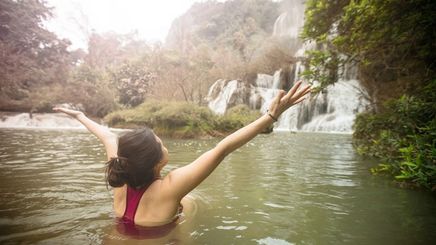
Water therapy, also known as hydrotherapy, uses water to treat many physical issues. You can try it to alleviate peptic ulcers, fibromyalgia, burns, and arthritis. Water therapy targets the physical and to bring holistic relief.
Some water therapy practices are so basic, you can practice them at home. Others use special equipment and require specialized locations. During water therapy, you get submerged in pressurized, temperature-controlled water. Here are some benefits:
Relaxation
According to the International Journal of Environmental Research and Public Health, water therapy maximizes the characteristics and advantages of water. Alternative and clinical medicine practitioners recommend it because it's not physically straining.
Water therapy is also relaxing. A warmer temperature can soothe sore muscles. Studies about winter bathing also show how cold water can help improve moods. The density of water also works well with the density of the water in your body, which helps induce pleasure.
Recovery After Workouts
Professional athletes use hydrotherapy to recover after their workouts and sports activities, in particular, the more difficult ones. The North American Journal of Medicine and Science says that submerging in water helps athletes circumvent delayed onset muscle soreness. Athlete-respondents felt that alternating between warm- and cold-water immersion during water therapy helped them recover from challenging workouts.
Relief During Pregnancy and Childbirth
An International Journal of Environmental Research and Public Health study states that water therapy may help with the aches caused by when submerged in pressurized water. Some people even use water therapy to lessen pain and induce relaxation during a water birth.
Get the all-clear from your doctor before trying any therapy or products if you're pregnant.
Advantages in Low Impact Exercise
Aquatic exercises are a form of water therapy. It is a low-impact activity done in water that doesn’t put stress on the joints. It also relieves pain. A perfect example is aquarobics, which involves dance movements and gliding.
Reduces Arthritic Symptoms
If you suffer from arthritis, water therapy may be the way to go. A study in the International Journal of Rheumatic Diseases finds that patients with rheumatoid arthritis who did water therapy at a moderate intensity had improved symptoms, including less oxidative stress. A study in the journal Clinical Rehabilitation says that people with osteoarthritis in the knee had better pain and knee function after eight weeks of water therapy via aqua aerobics.
Healthy Skin and Hair
Water therapy also works for hair and . According to the Journal of Clinical Medicine, a cold pillow compress, a form of water therapy, has been proposed to reduce alopecia and hair follicle damage.
Try water-based skincare products to complement your water therapy practice. Use Eskinol Naturals Micellar Water Clear with Natural Lemon Extracts. A natural cleanser for combination skin, it has a mattifying formula that gently nourishes and purifies the skin.
Your skin needs to hydrate when you towel yourself down after water therapy. Try POND'S Aloe Vera Jelly Moisturizer. This oil-free gel moisturizer is enriched with 100% and . It leaves the skin fresh and hydrated.